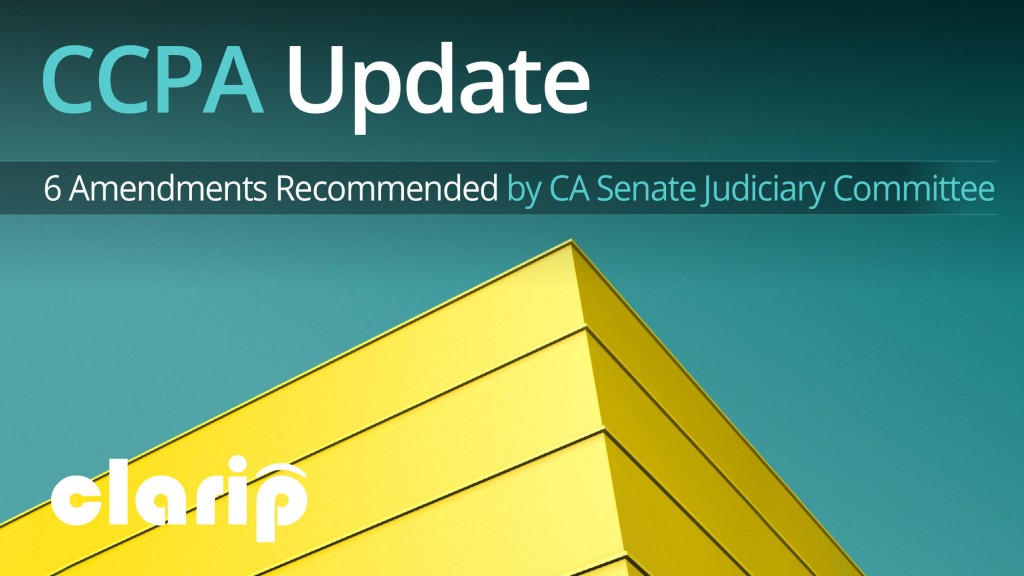Six CCPA Amendments Recommended by CA Senate Judiciary Committee
Here is the rundown on the proposed California Consumer Privacy Act (CCPA) amendments that were considered by the California Senate Judiciary Committee on Tuesday ahead of the legislative deadline to refer bills to the Appropriations Committee for fiscal review. There were eight bills to amend the CCPA on the agenda – all of them were previously approved by the California State Assembly in a floor vote.
By our count, six CCPA amendments are proceeding to the Senate Appropriations Committee for fiscal review: AB-25 (employee data), AB-846 (loyalty programs), AB-874 (publicly available information), AB-1146 (vehicle information), AB-1355 (technical amendments), and AB-1564 (toll free number alternative).

Our notes on each CCPA amendment considered:
AB25 – Employee Data – PASSED TO APPROPRIATIONS
The author accepted the committee’s proposed amendments to the legislation and it received a recommendation of due pass with amendments by a vote of 8-0-1. These amendments were in addition to the author’s prior amendments in June – which means the Senate will now be considering very different text than was passed by the California State Assembly. The biggest change proposed by the committee was to sunset the exclusion of employee data in the CCPA after one year. The stated purpose of this sunset was to give the interested parties a year to figure out what privacy protections should apply to employee data.
AB846 – Loyalty Programs – PASSED TO APPROPRIATIONS
The author accepted two of the changes recommended by the Committee in the Bill Analysis at the start of the hearing. She also accepted another suggested by Senator Jackson at the end of the hearing that data from loyalty programs could not be sold after the industry representative said that retailers do not sell the loyalty program data. With these amendments, it was recommended by a vote of 8-0-1.
AB873 – Deidentified PI
After a vigorous debate over deidentification, the vote on this bill was 3-3 in the committee. The author at the hearing requested reconsideration and this was granted. Without another hearing currently scheduled ahead of the deadline, it is unclear how the reconsideration process would work. So it is probably safe to say that these amendments are on life support but not yet completely dead (for now).
AB874 – Publicly Available Information – PASSED TO APPROPRIATIONS
This bill was on the Senate Judiciary Committee’s consent list and passed shortly after the committee established a quorum in a group of other bills as part of the committee’s consent calendar.
AB1146 – Vehicle Information Exemption – PASSED TO APPROPRIATIONS
This bill was originally on the consent calendar but was pulled off of it when there was unexpected opposition on the day of the hearing. There was a bit of confusion around the precise opposition, since they started testifying during the period reserved for supporters of the bill. Given the full committee calendar, the committee recommended passing it by a vote to 8-0-1 and the author promised to work with the opposition to consider any necessary amendments before it goes to the Senate Appropriations Committee.
AB1355 – Technical Amendments – PASSED TO APPROPRIATIONS
This bill was also on the consent list similar to AB874.
AB1416 – Four Year Exception for Sharing with Government or for Security/Fraud
This bill was pulled by Assemblymember Cooley and was not heard on Tuesday.
AB1564 – Toll Free Number Alternative – PASSED TO APPROPRIATIONS
The author accepted the suggested committee recommendations which would allow online businesses with a direct customer relationship to avoid the physical mailing address requirement as part of the provided alternative to the toll free number requirement. The committee recommended the bill on a vote of 8-0-1 on the motion to pass as amended.
The approved bills will now head to the Senate Appropriations Committee for fiscal review before a floor vote. The bills that are approved with amendments by a vote on the Senate floor will need to either be approved again by the Assembly with the new text or they will need to go through reconciliation and the new version passed by both legislative bodies.
The one-month summer recess for the California legislature is scheduled to begin on Friday, July 12th. When the legislature returns in mid-August, they will have until August 30th for the fiscal committees to report bills to the Floor. The last day of the 2019 legislative session for each house to pass bills and send them to the California Governor is September 13, 2019. Bills that are reported to the Governor must be signed or vetoed by October 13, 2019. Any statutes that are passed and signed will go in effect on January 1, 2020 along with the California Consumer Privacy Act.

 Data Risk Intelligence
Data Risk Intelligence Automated Data Mapping
Automated Data Mapping Do Not Sell/Do Not Share
Do Not Sell/Do Not Share Cookie Banner Solutions
Cookie Banner Solutions Consent & Preferences
Consent & Preferences Data Rights Requests
Data Rights Requests
